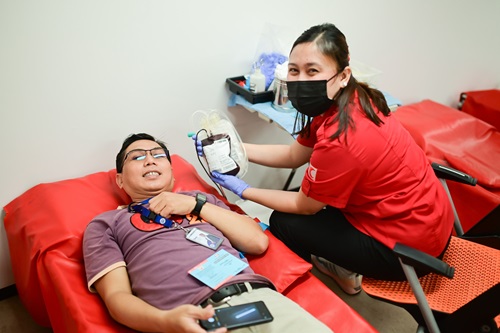Why Foreign Workers Should Donate Blood in Singapore: A Vital Contribution to the Community

Singapore is a multicultural and diverse society that relies heavily on foreign workers across various sectors, including construction, healthcare, manufacturing, and domestic services. These workers play an essential role in the country’s economy and day-to-day life. Beyond their economic contributions, foreign workers in Singapore have the unique opportunity to make a significant impact on the community by participating in blood donation. Here’s why foreign workers should consider donating blood in Singapore.
1. Making a Difference in the Lives of Others
Supporting a Critical Healthcare Need:
- Blood donation is a life-saving act that supports patients undergoing surgeries, cancer treatments, trauma care, and those with chronic conditions like anemia or thalassemia. The need for blood in Singapore is constant, and by donating blood, foreign workers can directly contribute to saving lives and improving the health of others in the community.
Addressing Blood Supply Challenges:
- Singapore faces a continuous demand for blood due to its aging population and the prevalence of complex medical procedures. Donating blood helps alleviate the pressure on the blood supply system, ensuring that hospitals have the necessary resources to treat patients effectively.
2. Building a Stronger Community Connection
Fostering a Sense of Belonging:
- For many foreign workers, living and working in a foreign country can be challenging. Blood donation offers a way to connect with the local community and contribute positively to the society they are a part of. It fosters a sense of belonging and integration, making foreign workers feel more connected to Singapore and its people.
Promoting Multicultural Unity:
- Singapore is a melting pot of cultures, and blood donation is a universal act of kindness that transcends cultural and national boundaries. When foreign workers donate blood, they participate in a collective effort to support the health and well-being of all residents, regardless of their background. This promotes unity and mutual respect within Singapore’s diverse society.
3. Personal Health Benefits
Health Check and Awareness:
- Blood donation involves a preliminary health screening that includes checking hemoglobin levels, blood pressure, and overall health. This process can help foreign workers monitor their health and detect potential issues early. Regular donors also receive updates on their blood type and health status, which can be beneficial for personal health awareness.
Reducing the Risk of Certain Conditions:
- Some studies suggest that regular blood donation may have health benefits, such as reducing the risk of heart disease by lowering iron levels in the blood. While these benefits are not the primary reason to donate, they can be a positive side effect of regular blood donation.
4. Strengthening Singapore’s Blood Donation System
Diverse Blood Types and Rare Donations:
- The diversity of foreign workers in Singapore means that they bring with them a wide range of blood types. Some blood types, particularly rare ones, may be underrepresented in Singapore’s blood donor pool. By donating blood, foreign workers can help ensure that all blood types are available for patients in need, including those with rare blood groups.
Supporting Emergency Preparedness:
- In times of emergency, such as natural disasters or large-scale accidents, the need for blood can spike suddenly. A robust and diverse blood donor base, including foreign workers, is crucial for Singapore to be prepared for such events. Donating blood regularly helps maintain a ready supply that can be mobilized quickly in a crisis.
5. Encouraging a Culture of Giving
Setting an Example for Others:
- When foreign workers donate blood, they set a positive example for their peers and the broader community. Their participation can inspire others—both fellow foreign workers and local residents—to consider donating blood. This ripple effect can help increase overall blood donation rates in Singapore, ensuring a stable and sufficient supply.
Contributing to Corporate Social Responsibility (CSR):
- Many foreign workers are employed by companies that have active Corporate Social Responsibility (CSR) programs. By participating in blood donation drives organized by their employers, foreign workers can contribute to their company’s CSR efforts, enhancing the company’s reputation and commitment to social good.
6. Overcoming Barriers to Donation
Addressing Common Concerns:
- Some foreign workers may hesitate to donate blood due to fears or misconceptions about the process. It’s important to understand that blood donation in Singapore is safe, and the process is conducted using sterile, single-use equipment to ensure donor safety. Education and awareness campaigns can help dispel myths and encourage more foreign workers to participate in blood donation.
Language and Cultural Support:
- To encourage foreign workers to donate blood, it’s essential to provide language support and culturally sensitive information about the donation process. Organizations like the Singapore Red Cross and community groups can play a key role in reaching out to foreign workers, providing them with the necessary information and support to make informed decisions about donating blood.
Conclusion
Foreign workers in Singapore have a unique opportunity to make a profound impact on the community through blood donation. By donating blood, they can save lives, foster a sense of belonging, and contribute to Singapore’s emergency preparedness and healthcare needs. As Singapore continues to thrive as a multicultural society, the participation of foreign workers in blood donation will not only support the nation’s healthcare system but also promote unity and mutual understanding within the community. Blood donation is a simple yet powerful way for foreign workers to give back to the country that they temporarily call home, leaving a lasting legacy of compassion and generosity.




